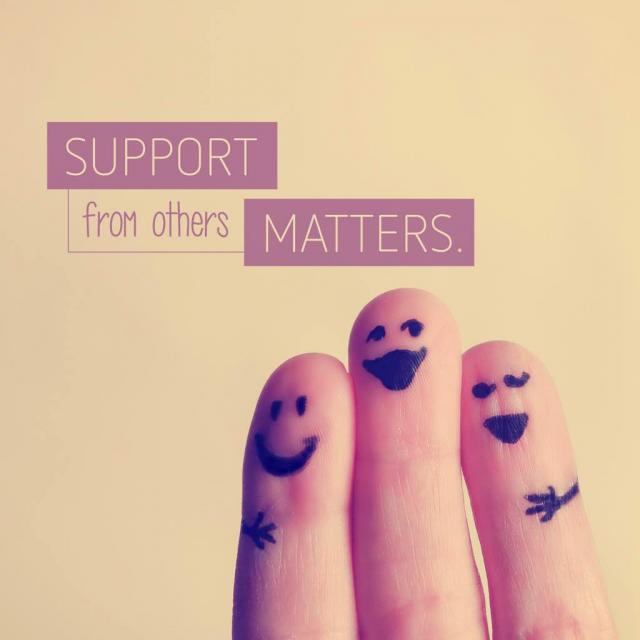Someone who feels supported is more likely to quit smoking for good. That’s why friends, family members, and significant others can play a big part in helping a person become smokefree.

Here are some tips that can help you support the person in your life who is quitting smoking. The more you know, the more you can help.
It’s Hard to Quit
Smoking cigarettes isn't a bad habit. It's a serious and complicated addiction. That makes quitting smoking one of the biggest challenges many smokers will ever face.
Deciding to quit doesn't mean thoughts of smoking go away at once. It takes time for cravings to fade, and it can take a person more than one try to successfully quit. Most people who quit don't do it on their own. They get a lot of help and support from friends, family, and significant others.
Learn more about why quitting is so hard.
Know Your Relationship Style
The way you deal with smoking can have an effect on a person who is trying to quit. It helps to become aware of your relationship style. Your style affects their smoking, their quitting, their health, and yours. Ask yourself these questions:
- Do you mind that they smoke around you?
- Do you argue about smoking?
- Do you avoid talking about smoking?
- Has a health problem changed the way you deal with smoking?
Understanding your relationship style can help you understand what both of you may have to change to better deal with their smoking and quitting. For example, you may need to:
- Recognize your friend or family member’s small successes when quitting.
- Avoid criticizing them if they slip and have a cigarette.
- Decide it's time for you to quit smoking, too.
Start the Conversation
It can be hard to get someone to talk about quitting smoking. To get a conversation started, look for an opening. Respond positively when someone says:
- "I'm thinking about quitting smoking."
- "My doctor told me that I should quit smoking."
- “I’m pregnant. I should probably quit smoking.”
- “My wife is pregnant. I should probably quit smoking for her.”
- "My kids are asking me about my cigarettes. I should probably quit smoking for them."
Let them know you think it's great they're considering quitting and that you're ready to help. If you're an ex-smoker, you can draw from your own experience of quitting. Let them know how much better you feel now that you're smokefree. You might say:
- "I'm so proud of you for trying to quit smoking. I'll help with whatever you need to make it happen."
- "Quitting smoking will be hard, but I know you can do it. Have you set a quit date?"
- "You're not in this alone. Even if it gets tough, I'll be here for you."
- "Quitting smoking is the best thing I ever did! Let me know if you need any tips."
Create an Opening
If someone doesn’t give you an opening, create one. Ask them whether they’ve thought about quitting. Or you could try a different approach. You might say:
- "I heard on the news that taxes on cigarettes might go up soon. Sounds expensive. What do you think?"
- "I saw a commercial last night that showed an ex-smoker who lost teeth from gum disease caused by smoking. I didn't know that could happen. Did you?"
Ask Questions
Asking open-ended questions can help you understand what a smoker who is quitting is going through. You might ask:
- "What made you want to start smoking?"
- "What things make you crave a cigarette?"
- "What made you decide to quit smoking?"
- "What things have been stressing you out lately?"
- "What could I do to help make quitting easier for you?"
Listen
Quitting smoking is about them—not you. Listen to what they have to say. If you ask a question, be quiet and give them time to answer. Resist the urge to insert your own comments.
Don't Lecture
Lectures, nagging, and scolding won't help your friend or family member quit smoking. It might just put you on their bad side, and they may not come to you for help when they really need it.
Here are some things to avoid when you’re trying to help someone quit smoking:
- Nagging them about why smoking is bad.
- Counting the number of cigarettes they smoked.
- Asking them if they smoked today.
- Arguing with them about being irritable when they're going through withdrawal.
- Giving them a hard time if they have a bigger appetite from withdrawal.
- Getting upset if they slip and smoke a cigarette.
Offer Distractions
Lend support to your friend or family member by helping them plan smokefree activities. If you're still smoking, avoid smoking around them, especially if you call an activity “smokefree.”
Here are a few activities you could suggest:
- Go to the movies (and let them choose the show).
- Take a walk.
- Plan a game night with a group of friends.
- Make dinner.
- Go out to eat at their favorite restaurant.
- Sign up for a class like photography, painting, or cooking.
- Go to a concert.
- Go to a basketball, baseball, or football game where smoking is not allowed.
Triggers and cravings are a normal part of the quitting process. Help your friend or family member plan ahead by thinking of ways to handle these urges until they go away. Some people find that distracting themselves by texting or checking their social media helps pass the time until the craving is gone, while other people are helped by a change of scenery or routine. Talk about it and plan for different situations.
Here are some ideas:
- Chew gum or slowly eat hard candy.
- Play a game on your cell phone. Check out Smokefree’s quitSTART app, which has games and challenges for distraction.
- Put a straw or toothpick in your mouth.
- Switch tasks for a change of scenery.
- Play with a rubber band.
- Munch on some carrot sticks, nuts, or celery.
- Squeeze a stress ball.
- Take deep breaths and try to relax.
- Drink lots of water.
Put together a smokefree quit kit with a few of these items for your friend or family member to help them be ready to deal with cravings in the moment.
Be Patient and Positive
Supporting someone who is trying to quit smoking can be frustrating and exhausting. Focus on staying upbeat. Don’t give up on them. Your support is important.
The withdrawal that can come from quitting smoking may make a person moody and irritable. Avoid:
- Taking their moods personally.
- Telling them it was easier to put up with their moods when they were smoking.
- Suggesting it would be easier for them to just go back to smoking.
The cravings a person might face can be hard to deal with. Don't let them lose confidence in quitting. Check in on them and let them know you support them. You might say:
- "I can tell this is hard on you, but I'm proud of you for sticking with it. Let's do something fun to celebrate how far you've come!"
- "It sounds like you're having a rough day. How about I take care of dinner tonight/watch the kids/mow the lawn, so you can have some time for yourself? You deserve it."
Don't Be Too Hard on Them if They Slip
Your friend or family member may slip at some point and smoke a cigarette. They'll probably feel guilty, so getting angry with them will not help. Instead, you could:
- Tell them you know they can still quit and remind them of all the progress they have made.
- Help them figure out what triggered the craving that led to the slip.
- Help them come up with a plan for dealing with the craving if it happens again.
- Ask if there is anything else you can do to help.
- Suggest they text SLIP to 47848 for immediate help. If they want more, they can text QUIT to 47848 and enroll in the full 6-8 week SmokefreeTXT program for daily support.
- Help them keep track of when they slip and be aware of the situations and places that are making quitting difficult.
Here are some ways you could respond to a slip:
- "Slips happen. Don't beat yourself up over it! Like anything tough, you learn as you go. Use right now as a time to restart and get back on track."
- "So you slipped. Quitting isn't easy and many people need several tries before they quit for good. You’ve got this, and I'm here for you."
- "Let's talk about what's triggering you to smoke. That will help you stay on track this time. Just don't smoke that next cigarette!"
Celebrate Successes Big and Small
Recognize your friend or family member's smokefree successes and milestones. Staying smokefree for one day, one week, or one year are all reasons to celebrate. So are throwing out all of the ashtrays in the house, ditching any reminder of cigarettes, and passing on an after-dinner cigarette. Help your friend or family member celebrate by:
- Sending flowers or a card.
- Surprising them with tickets to a concert or show.
- Giving them a gift card to their favorite store.
- Making a home-cooked dinner.
A compliment can go a long way to recognize the positive changes they’ve made:
- "The smokefree life works well for you—you look great!"
- "You make quitting smoking look easy. You should be proud of yourself. I am!"
Help Them De-stress
Quitting smoking can create a lot of stress, which may cause someone to reach for a cigarette. If you notice they are stressed, help them break the cycle by finding healthier ways to de-stress. If you smoke, remember not to agree to have a cigarette together—that will set them back.
Consider suggesting one of these smokefree stress relievers:
- Close your eyes and take a few deep breaths.
- Play with a pet.
- Take a walk.
- Make a nice dinner.
- Read the Sunday comics.
- Try yoga or a spin class.
- Go to a comedy club or watch a funny TV show.
- Do a fun home project.
- Watch a sunset or sunrise.
- Do a crossword puzzle.
- Meet a friend at a cafe to chat.
- Take a nap.
- Take a bath or long shower.
Be There for the Long Haul
The challenges of quitting smoking don't end when a person puts down their last cigarette. Cravings can pop up weeks, or even months, later. It's not uncommon for ex-smokers to start smoking again within the first three months of quitting.
Let your friend or family member know you're there for the long haul. Keep celebrating their smokefree anniversaries and offer distractions to help them deal with cravings. Your ongoing support could be all they need to make this quit attempt their last.








